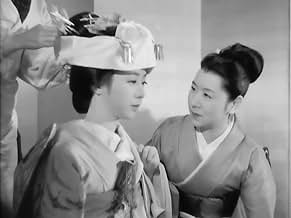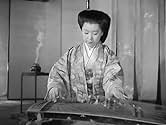IMDb-BEWERTUNG
7,4/10
2026
IHRE BEWERTUNG
Shinnosuke wird Shizu als zukünftige Frau vorgestellt, aber er verliebt sich in ihre verwitwete Schwester Oyu. Oyu überzeugt Shinnosuke und Shizu zu heiraten, damit sie in der Nähe von Shinn... Alles lesenShinnosuke wird Shizu als zukünftige Frau vorgestellt, aber er verliebt sich in ihre verwitwete Schwester Oyu. Oyu überzeugt Shinnosuke und Shizu zu heiraten, damit sie in der Nähe von Shinnosuke bleiben kann.Shinnosuke wird Shizu als zukünftige Frau vorgestellt, aber er verliebt sich in ihre verwitwete Schwester Oyu. Oyu überzeugt Shinnosuke und Shizu zu heiraten, damit sie in der Nähe von Shinnosuke bleiben kann.
- Regie
- Drehbuch
- Hauptbesetzung
Empfohlene Bewertungen
Yûji Hori has hired a match maker, but he has rejected all of her proposed ladies. Finally she brings to him Nobuko Otowa. He is iffy about her, and the match maker's patience is running short. Does he even know what he is looking for in a wife? He knows. It is the woman who accompanied Miss Otowa, her widowed sister Kinuyo Tanaka. However, her son is the clan heir, and therefore she may not remarry. She urges him to marry her sister, so she can visit her.
Kenji Mizoguchi's movie is not one of his great movies, but it is an impeccably executed bit of soap opera. All three principals are aware of each other's feelings, and nothing is said. When Miss Tanaka's son dies, she is thrust from her home, her brother will not take her in, nor can she move in with her sister -- the gossip would only increase.
As I said, it's not one of Mizoguchi's major works, but that doesn't mean he did a shoddy job; he seemed incapable of that. The last two shots, with their subjective cameras, are heartbreaking.
Kenji Mizoguchi's movie is not one of his great movies, but it is an impeccably executed bit of soap opera. All three principals are aware of each other's feelings, and nothing is said. When Miss Tanaka's son dies, she is thrust from her home, her brother will not take her in, nor can she move in with her sister -- the gossip would only increase.
As I said, it's not one of Mizoguchi's major works, but that doesn't mean he did a shoddy job; he seemed incapable of that. The last two shots, with their subjective cameras, are heartbreaking.
Set in contemporary Japan to the director, specifically in Kyoto, the film tells the story of a young man who falls in love with his wife's widowed older sister. This triggers a deep triangle of feelings and drama that the director stages with his unique style of theatricality and artistic attention to every scene. Much refinement in the way of treating the story and psychological attention to the characters who are immersed in a country and a society where living and loving completely seems almost impossible..
One of the most beautiful films by Mizoguchi that I have seen. The character of Mrs. Oyu stands out strongly for her charm and remains very much as an image.
For a few moments, Truffaut's film Jules and Jim from 1962 immediately came to mind.
For a few moments, Truffaut's film Jules and Jim from 1962 immediately came to mind.
Shinnosuke accepts to marry Shizu in order to be closer to her sister, a widowed wife and mother of a son. Shizu proposes him marriage because doing so would mean staying near her sister, not marrying him and marrying another man would mean to separate from her. Japanese customs forbid Oyu (shizu's sister) to marry another man because it is her duty to educate his son for him to become one day the head of her deceased husband family. Oyu has the same feelings Shinnosuke has for her, so the marriage between him and her sister allows them to be together apparently with no suspicion. The three of them develop a strange bond.
There's really not much to say about the technical aspects in this film, if you know Mizoguchi's directing you know you're in good hands. Anyway though, as usual, the scenes are beautifully shot. I even found myself really liking the music here, it adds perfectly to the atmosphere.
Overall, this is another another great film from Mizoguchi that's worth the time.
There's really not much to say about the technical aspects in this film, if you know Mizoguchi's directing you know you're in good hands. Anyway though, as usual, the scenes are beautifully shot. I even found myself really liking the music here, it adds perfectly to the atmosphere.
Overall, this is another another great film from Mizoguchi that's worth the time.
"Miss Oyu" is about a man in love with the elder sister of his wife. In fact he was already in love when he married, and he married only to become the brother in law of his loved one.
In Western style movies this love triangle would be all about trickery and deceit. In this Japanese film it is all about self sacrifice. The wife knows very well that her husband doesn't love her but wants to allow her sister a sexual relationship. A relationship that tradition denies to a widow with children.
The only Western film that vaguely resembles "Miss Oyu" in the treatment of a love triangle is part 9 of the "Dekalog" (1989, Krzysztof Kieslowski) in which an impotent man encourages his wife to take a lover. In this film self sacrifice ex ante does not preclude jealousy ex post. Also in "Miss Oyu" self sacrifice has its price.
"Miss Oyu" is based on a story by Junichiro Tanizaki and directed by Kenji Mizoguchi. Given these two big names one would expect a film of high quality. "Miss Oyu" is however at times very sentimental.
The reason probably is that "Miss Oyu" is the first film Mizoguchi made for the Daiei studio and the Daiei studio needed a commercial success very badly. By the term "studio system" everybody thinks of Hollywood, but the studio system in Japan worked more or less the same. When you were a renowned director, as Mizoguchi was, you were allowed to make one film for the sudio and one film according to your own artistic interest. "Miss Oyu" was for the studio.
In Western style movies this love triangle would be all about trickery and deceit. In this Japanese film it is all about self sacrifice. The wife knows very well that her husband doesn't love her but wants to allow her sister a sexual relationship. A relationship that tradition denies to a widow with children.
The only Western film that vaguely resembles "Miss Oyu" in the treatment of a love triangle is part 9 of the "Dekalog" (1989, Krzysztof Kieslowski) in which an impotent man encourages his wife to take a lover. In this film self sacrifice ex ante does not preclude jealousy ex post. Also in "Miss Oyu" self sacrifice has its price.
"Miss Oyu" is based on a story by Junichiro Tanizaki and directed by Kenji Mizoguchi. Given these two big names one would expect a film of high quality. "Miss Oyu" is however at times very sentimental.
The reason probably is that "Miss Oyu" is the first film Mizoguchi made for the Daiei studio and the Daiei studio needed a commercial success very badly. By the term "studio system" everybody thinks of Hollywood, but the studio system in Japan worked more or less the same. When you were a renowned director, as Mizoguchi was, you were allowed to make one film for the sudio and one film according to your own artistic interest. "Miss Oyu" was for the studio.
Kenji Mizoguchi's movie 'Miss Oyu' is simply masterful. It is based on a short story (The reed cutter) by Junichiro Tanizaki. But, while the motives and the emotions of the protagonists in the short story are sometimes rather ambiguous, they are totally purified in the screenplay. The protagonists exemplify traditional family roles and are confronted with these traditions, like in this movie a widow with children. She cannot remarry, because she must stay in her husband's family home to raise her children.
The main topic of the movie is forbidden love, and more generally the impossibility of being happy in this world, which are very characteristic themes in Kenji Mizoguchi's films. The film illustrates also some typical aspects of J. Tanizaki's work, like the 'physical' (facial) influence of a mother on the future emotional life of her son, or the fear of scandal and of losing one's face in society.
This film shines through the purity and the intensity of the emotions of the protagonists (hidden for a long time, they erupt violently), through the marvelous performances of the actors and through its forceful message about the all importance of love. A must see.
The main topic of the movie is forbidden love, and more generally the impossibility of being happy in this world, which are very characteristic themes in Kenji Mizoguchi's films. The film illustrates also some typical aspects of J. Tanizaki's work, like the 'physical' (facial) influence of a mother on the future emotional life of her son, or the fear of scandal and of losing one's face in society.
This film shines through the purity and the intensity of the emotions of the protagonists (hidden for a long time, they erupt violently), through the marvelous performances of the actors and through its forceful message about the all importance of love. A must see.
Wusstest du schon
- VerbindungenReferenced in Aru eiga-kantoku no shôgai (1975)
Top-Auswahl
Melde dich zum Bewerten an und greife auf die Watchlist für personalisierte Empfehlungen zu.
Details
Box Office
- Weltweiter Bruttoertrag
- 5.020 $
- Laufzeit
- 1 Std. 34 Min.(94 min)
- Farbe
- Sound-Mix
- Seitenverhältnis
- 1.37 : 1
Zu dieser Seite beitragen
Bearbeitung vorschlagen oder fehlenden Inhalt hinzufügen













